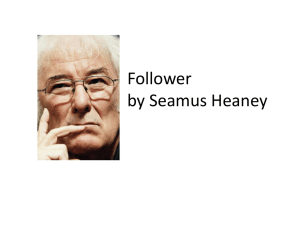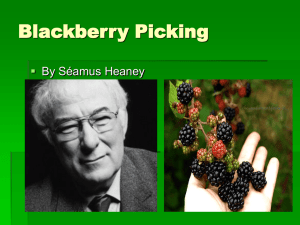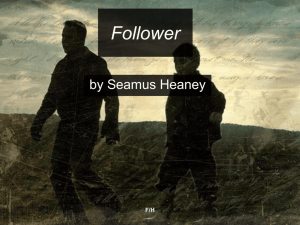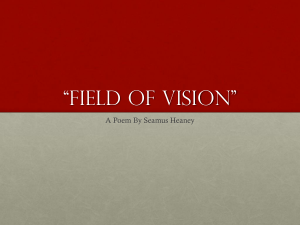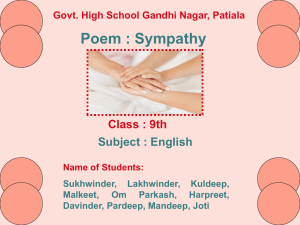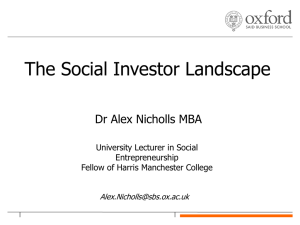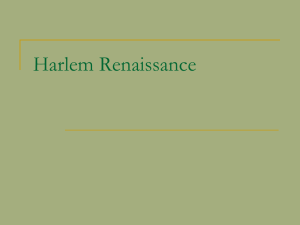Seamus Heaney Revision
advertisement
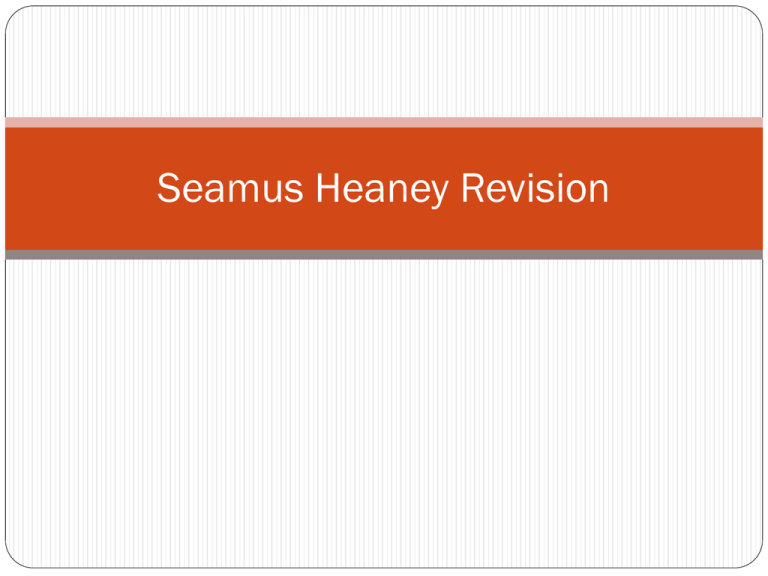
Seamus Heaney Revision ‘The Underground The poem opens with an honest depiction of their honeymoon in London ‘There we were in the vaulted tunnel running, You in your going-away coat speeding ahead’ It is clearly simply an honest description of an even during the honeymoon of Heaney and his wife Marie. The Underground They appear to be running late for the ‘Proms’ because they are too busy ‘mooning around’ on their honeymoon. They are love’s young dream, unable to keep their hands and eyes off one another. Heaney refers to the ‘new white flower’ which suggests his new and innocent bride. He contrasts this with ‘crimson’ a vibrant colour which in my opinion indicates their sexual desire and activity. The inclusion of ‘you’ and ‘me’ reveals their intimacy and closeness. The Underground The tone in the initial stanzas is playful and fun like their relationship early in their marriage. Heaney adopts a very personal tone ‘There we were’. He shares an intimate moment with the reader and is honest in his description. He reveals that he was following her ‘like a fleet god gaining’ The Underground The poet cleverly uses verbs and words that are full of energy to reflect the level of energy in the chase and their relationship ‘running’, ‘gaining’ and ‘speeding’. As the newly married couple ran to catch the ‘Proms’, his wife’s jacket ‘flapped’ causing the buttons to come loose ‘button after button/Sprang off and fell in a trail’ The Underground Heaney returns to this location many years later to a ‘draughty lamplit station’ where he feels ‘tensed’ and ‘bared’. Things have changed dramatically, he is alone in the station where they were together, waiting for his wife’s ‘step’, where previously he was running behind her. Heaney compares himself to Orpheus when returning from the underground, only this time Heaney does not look behind him. Perhaps the poet is afraid of looking into the past or hidden memories. The final stanza is not energetic, it is closed, Heaney does not share these feelings with the reader. The Underground He is tense as he waits for his wife to return but he reveals he would be ‘damned’ if he looks back. Thus suggesting hostility or damage to their marriage over time. This poem provides us with an interesting mix of mythology and fairy tale. Heaney refers to the Greek myth of Orpheus and Eurydice, Eurydice dies from a snake bike and is trapped inthe underworld. Her husband was devastated and begged for her release, which unusually was granted. However, when they were being freed, Orpheus looked back in order to check his wife was behind him, she was condemned to remain in the underworld forever. The Underground It appears that Heaney also refers to the Greek myth of Syrinx , who was being chased by Pan . Terrified she called out for her father Ladon who turned her into a water reed just as Pan was about to grab her. Heaney also includes the fairy tale ‘Hansel’ and Gretel where the children used pebbles to find their way. Key Points Love is clearly depicted in the poem and is a key theme. It includes attraction, desire and excitement. Heaney refers to an ordinary human experience. .Heaney uses colloquial language and casual tones throughout the poem. .Heaney refers to the moon several times, which is associated with tides and the passing of time. There is a clear contrast between the opening ‘There we were’ with the ‘now’ of the stanza that retraces their steps to the ‘path back, lifting the buttons’. There is a clear change in the relationship. The atmosphere and mood of this poem are both exciting and gloomy at the same time. The poem is based on an allusion to at least one ancient Greek myth. The Underground’ provides the opportunity for an interesting glimpse of a normally private time in a couple’s time together. A Call The poem opens with an utterly familiar scene. The son (Heaney) calls his father who happens to be outside weeding the garden. We are introduced to an unidentified ‘she’. It is like we are overhearing a telephone conversation. We the reader, get a sense that we are eavesdropping (overhearing) on a private phone call. The tone is conversational, realistic and reflects the mundane moment being described. A Call While he is waiting for his father to come to the phone, Heaney imagines what his father is doing in the garden ‘ Down on his hands and knees’, he works ‘gently’, ‘Touching, inspecting’. It is clear that the poet knew the man as he is able to imagine his movements. He describes a gentle, caring individual who feels sorry ‘rueful’ for destroying weeds despite the necessity of having to remove them. The poet describes his father’s movements in great detail ‘Touching, inspecting, separating, one/ Stalk from the other. A Call He reveals his father is ageing ‘ frail’. The back garden is replaced by the deserted hall way, indicating a significant change in the tone of the poem; where the sounds are ‘amplified’ due to the quiet nature of the location and the long wait to hear his father’s voice. The tone changes significantly and the poem becomes emotional A Call The inclusion of the word ‘grave’ reminds us that death is edging closer from the moment we are born, even while we wait. As the clock ticks away all living things are eventually called to the ‘grave’. The poet finds himself thinking about death, how death calls each of us from life, like the simplicity of making a simple phone call. Death is depicted as a personal call, like a phone call from a loved one. A Call The final lines of the poem show the poet lifting the phone. Heaney is delighted to hear his voice after his thinking drifted towards death ‘ nearly said I loved him’. The inclusion of the word ‘nearly’ suggests a lack of communication. It may be that Heaney subconsciously views his father as representing an example of how one should choose to live their life. This line could also serve to suggest that love does not need to be expressed in words, there is no need because these feelings can be felt and experienced. Key Points The tone of the poem celebrates the poet’s father and his closeness to nature. The poem moves from a description of an ordinary, personal experience to a meditation on universal themes which are relevant to everybody. The poet’s father is depicted as a good man. The poem centres on the relationship between Heaney and his father. Despite the fact that the poet does not talk directly to his father, it is obvious that the speaker loves him. The descriptions of the speaker’s father at work tell us a great deal about the man’s personality. A Constable Calls The poem opens with the impersonal once more ‘He’- we do not know who he is. All we know is that he is the owner of the ‘bicycle stood at the window sill’ The first stanza is a detailed description of the ‘bicycle’, with its ‘rubber cowl of a mud-splasher’ and its ‘fat black handlegrips’. The images created are ugly and unpleasant and may serve to represent the owner of the bicycle. A Constable Calls Therefore the description we are given of the constable is not a clear one. Our knowledge of him is restricted to his mode of transport. The bicycle ‘stood at the window still’ creating a strange but yet threatening presence. The bicycle is now associated with a weapon ‘the spud’ of the dynamo ‘cocked back’ as though it were ready to shoot. A sense of fear is created through this association between the constable and the weapon especially as the ‘boot of the law’ can stamp people into the ground. A Constable Calls Heaney appears to be recalling an incident when a member of the RUC (police force) came to his father’s farm to record the areas of tillage into his ‘domesday book’. The young child is nervous and afraid as he observes the interaction between his father and the constable, thus highlighting the power the constables held over people In Northern Ireland at this time, the catholic community felt a sense of suspicion from authority figures. Domesday Book- a land survey commissioned to asses the extent of taxes each farmer/land had to pay. A Constable Calls It is clear that the ‘constable’ is unwelcome in their home. He is not offered a place to put his belongings. Instead his ‘cap was upside down, on the floor next to his chair’. He is not offered any food or drink, the family simply want him out of their home as quickly as possible. This suggests they may fear his presence and the ‘boot of the law’. A Constable Calls Heaney however notices the little details and decides to provide us with ‘the line of pressure ran like a bevel/ In his slightly sweating hair’. This could highlight the level of discomfort the constable felt after his long journey or an acute awareness of the feelings toward him and what he stood for. A Constable Calls The interaction between the constable and Heaney’s father is dominated by images of authority. Once the ‘heavy ledger’ had been ‘unstrapped’, Heaney’s father had to provide a precisely accurate account of ‘tillage returns/ In acres, roads, and perches’. It is clear that no inch of land should be excluded or there will be consequences through the boot of the law. A Constable Calls Arithmetic and fear’ highlight the fear felt by the child, who is listening to the calculations and interrogations. He fears for his father’s safety as he looks in fascinated horror at the ‘polished holster’ that holds the policeman’s ‘revolver’. There is an indication of violence here, the potential for violence is created Stanza six is the first time we the constable speak ‘Any other root crops?’ He asks an abrupt question and is answered in an equally abrupt manner ‘No’. A Constable Calls The lack of communication and unwillingness of either the constable or his father to engage in anything but official business is obvious. The poet’s father is simply trying to get rid of the constable without him finding the ‘line/ Of turnips’. The child is nervous, he does not want his father to get into trouble with the law. But he remembered another line of ‘root crops’, that his father had failed to mention. He fears that the constable will find out ‘Imagining the black hole in the barracks’. The child is terrified of what could happen in the ‘black hole’. The poet remembers the he ‘looked at me as he said goodbye’, perhaps the constable is human after all and is simply trying to reassure the terrified child or maybe he intention is not to threaten his family but simply do his job. Heaney remembered the look which suggests these visits made an impact on him. The constable was simply one of a number of oppressors to the catholic community in Northern Ireland. However it could also serve to suggest that there is a watchful, controlling presence in his community. The final lines of the poem depict the constable as a ‘shadow’ outside their window, he is far less threatening outside. He remains faceless. Once again there is a reference to his ‘boot’ reinforcing the power of the law. However the final line is worrying, ‘ the bicycle ticked, ticked, ticked’ as he left, which could suggest a ticking bomb. The bombing that dominated Northern Ireland for many years. What overall impression of the constable do you get from the above poem? (5) Where in the language of the poem is that most fully created? (10) What signs are there in the poem that the constable’s visit causes tension in the house? (10)

